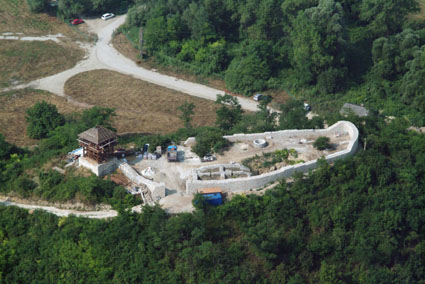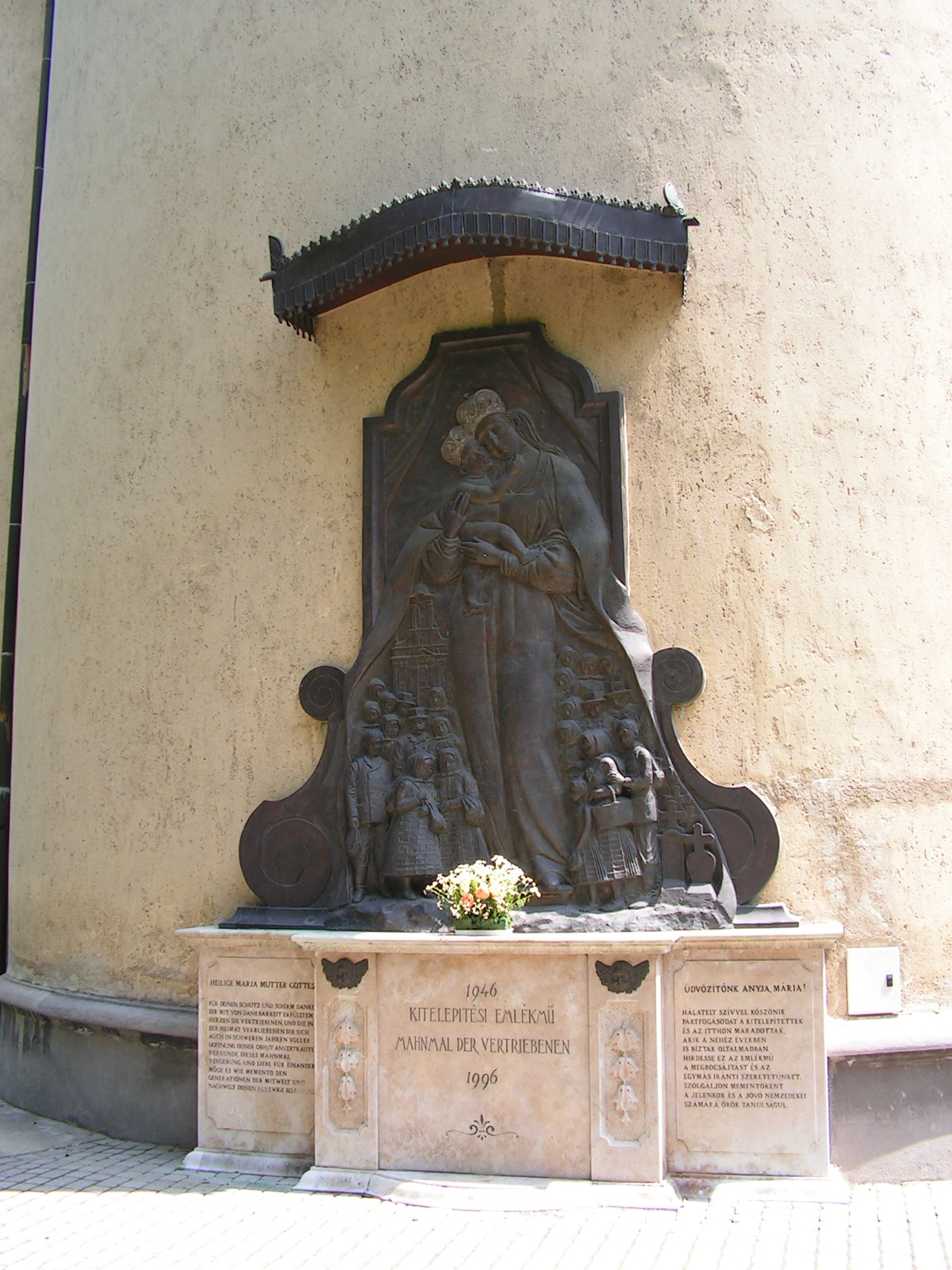Solymár on:
[Wikipedia]
[Google]
[Amazon]
Solymár (german: Schaumar) is an
 The village was uninhabited until the first new settlers arrived around 1700; first
The village was uninhabited until the first new settlers arrived around 1700; first  During
During
 *Historic Catholic church and other buildings in the village
*Hilltop ruins of a castle
*Budapest War Cemetery
*Historic Catholic church and other buildings in the village
*Hilltop ruins of a castle
*Budapest War CemeteryBudapest War Cemetery on CWGC website
/ref> contains 173 Commonwealth burials of the Second World War, all of them airmen whose graves were brought in from sites all over Hungary after the war, plus a single First World War burial. The cemetery also contains one French and 37 Polish War Graves. *On the slope of Zsiros Hill is the opening to the Devil's Hole Cave (''Ördöglyuk-barlang''), an extensive system approximately 3 kilometres long. It is possible for experienced spelunkers to explore the caves with a guide, but it is not otherwise accessible.
Kálmán Szente
(independent) *2010–
Kálmán Szente
(FIDESZ-KDNP)
Solymár, 1993
Solymár
Official website (in Hungarian)
Forum
Index.hu (in Hungarian) {{DEFAULTSORT:Solymar Populated places in Pest County Hungarian German communities
urban village
In urban planning and design, an urban village is an urban development typically characterized by medium-density housing, mixed use zoning, good public transit and an emphasis on pedestrianization and public space. Contemporary urban village id ...
in northwest of Budapest
Budapest (, ; ) is the capital and most populous city of Hungary. It is the ninth-largest city in the European Union by population within city limits and the second-largest city on the Danube river; the city has an estimated population ...
metropolitan area, bordering the 3rd and 2nd districts of the city, as well as Nagykovácsi
Nagykovácsi (whose name in English translates as "Great Smithy") is a small town in the Pilisvörösvári kistérség district of Hungary situated some north-west of the centre of Budapest, in a valley, at an altitude of 340 metres. It is locate ...
, Pilisszentiván, Pilisvörösvár
Pilisvörösvár (german: Werischwar or ) is a town in Pest County, Hungary.
Notable people
* Károly Erős, football player
* Laszlo Toth, Hungarian-Australian geologist & vandal
*Solomon Breuer, German rabbi
Twin towns – sister cities
Pili ...
, Csobánka, Pilisborosjenő, and Üröm. Its picturesque surroundings (hills to the south and east, the highest point is Zsíroshegy at 424m) and good accessibility the 64, 64A, 164, 264, 157 and 964 city buses from Hűvösvölgy, 218 from Óbuda
Óbuda was a town in Hungary that was merged with Buda and Pest on 17 November 1873; it now forms part of District III-Óbuda-Békásmegyer of Budapest. The name means ''Old Buda'' in Hungarian (in German, ''Alt-Ofen''). The name in Bosnian ...
, a train from Budapest Nyugati, and coaches from Árpád-híd) made it a desirable destination for affluent city-dwellers moving to suburban homes outside of Budapest from the mid-1990s.
History/people
The name of the village is first mentioned in a charter byBéla IV
Béla may refer to:
* Béla (crater), an elongated lunar crater
* Béla (given name), a common Hungarian male given name
See also
* Bela (disambiguation)
* Belá (disambiguation)
* Bělá (disambiguation) Bělá, derived from ''bílá'' (''wh ...
dated 5 May 1266, as Solomar. The most likely etymology of the name is Hungarian ''solymár'' (more commonly ''solymász''): ‘ falconer’, i.e., the place where the royal falconers live. (Several neighbouring villages were named similarly.) The village prospered during the following centuries and probably hosted a royal hunting castle ( Szarkavár), which burnt down after 1561. The advance of the Ottoman Empire
The Ottoman Empire, * ; is an archaic version. The definite article forms and were synonymous * and el, Оθωμανική Αυτοκρατορία, Othōmanikē Avtokratoria, label=none * info page on book at Martin Luther University) ...
left the village deserted after 1580.
 The village was uninhabited until the first new settlers arrived around 1700; first
The village was uninhabited until the first new settlers arrived around 1700; first Serbians
The term Serbians in English is a polysemic word, with two distinctive meanings, derived from morphological differences:
* Morphology 1: Serb- ian- s, derived from the noun ''Serb'' and used interchangeably to refer to ethnic Serbs, thus havi ...
and Bulgarians
Bulgarians ( bg, българи, Bǎlgari, ) are a nation and South Slavic ethnic group native to Bulgaria and the rest of Southeast Europe.
Etymology
Bulgarians derive their ethnonym from the Bulgars. Their name is not completely unders ...
migrated from the south, to escape the withdrawing Ottoman forces. Soon afterward came Bavarian immigrants, recruited by the monarchy from Habsburg and similar southern provinces along the Danube. The Crown paid their transportation and assisted in their getting settled in Hungary; the newcomers were promised they could retain their language and religion (generally Roman Catholic
Roman or Romans most often refers to:
*Rome, the capital city of Italy
* Ancient Rome, Roman civilization from 8th century BC to 5th century AD
* Roman people, the people of ancient Rome
*'' Epistle to the Romans'', shortened to ''Romans'', a let ...
). The monarchy wanted to resettle the area and knew the Germans could restore farmlands along the Danube. Because the settlers continued to speak a form of German and maintained their cultural and religious traditions, they were called ''die Donauschwaben'' ( Danube Swabians). Their descendants, who were citizens of the Austro-Hungarian Empire and succeeding governments, later formed the great majority of the population in this area and called the village ''Schaumar'' in German.
 During
During World War II
World War II or the Second World War, often abbreviated as WWII or WW2, was a world war that lasted from 1939 to 1945. It involved the vast majority of the world's countries—including all of the great powers—forming two opposing ...
, Adolf Hitler
Adolf Hitler (; 20 April 188930 April 1945) was an Austrian-born German politician who was dictator of Nazi Germany, Germany from 1933 until Death of Adolf Hitler, his death in 1945. Adolf Hitler's rise to power, He rose to power as the le ...
appealed to ethnic Germans in other countries, no matter how long they had resided there. In some areas, ethnic Germans supported his program, but in many cases had loyalty to where they were living. Because part of the Nazi rationale for war was to unite all ethnic Germans and oppress and exterminate other populations, many eastern European countries, such as Hungary, Poland and the Soviet Union, expelled ethnic Germans after the war. About half the population of Solymár was deported to Germany in 1946 as a collective punishment as part of that massive displacement. More than 330 households in Solymár were vacated.
The empty houses were occupied by ethnic Hungarians relocated from other parts of the country (mainly Mezőkövesd
Mezőkövesd is a town in Borsod-Abaúj-Zemplén county, Northern Hungary. It lies from Miskolc and from Eger.
History
The area has been inhabited since the Great Migration. It is likely that the first Hungarian settlement was formed here sh ...
), as well as refugees from Transylvania
Transylvania ( ro, Ardeal or ; hu, Erdély; german: Siebenbürgen) is a historical and cultural region in Central Europe, encompassing central Romania. To the east and south its natural border is the Carpathian Mountains, and to the west the Ap ...
. In later years, ethnic Hungarians deported from Czechoslovakia
, rue, Чеськословеньско, , yi, טשעכאסלאוואקיי,
, common_name = Czechoslovakia
, life_span = 1918–19391945–1992
, p1 = Austria-Hungary
, image_p1 ...
arrived. Together with the large-scale migration of people from Budapest in the past decades of suburbanization
Suburbanization is a population shift from central urban areas into suburbs, resulting in the formation of (sub)urban sprawl. As a consequence of the movement of households and businesses out of the city centers, low-density, peripheral urba ...
, ethnic Germans have become a minority of the population. Since 1990 the deportation has been commemorated; a memorial was installed at Templom tér.
Attractions
 *Historic Catholic church and other buildings in the village
*Hilltop ruins of a castle
*Budapest War Cemetery
*Historic Catholic church and other buildings in the village
*Hilltop ruins of a castle
*Budapest War Cemetery/ref> contains 173 Commonwealth burials of the Second World War, all of them airmen whose graves were brought in from sites all over Hungary after the war, plus a single First World War burial. The cemetery also contains one French and 37 Polish War Graves. *On the slope of Zsiros Hill is the opening to the Devil's Hole Cave (''Ördöglyuk-barlang''), an extensive system approximately 3 kilometres long. It is possible for experienced spelunkers to explore the caves with a guide, but it is not otherwise accessible.
Population
There are 9455 residents, mainly ethnic Hungarians, with a minority of ethnic Germans.Mayors
*1990–1994: Péter Dercsényi (Alliance of Free Democrats
The Alliance of Free Democrats – Hungarian Liberal Party ( hu, Szabad Demokraták Szövetsége – a Magyar Liberális Párt, SZDSZ) was a liberal political party in Hungary.
The SZDSZ was a member of the Alliance of Liberals and Democrat ...
(SZDSZ))
*1994–2006: László Enczmann (independent)
*2006–2010Kálmán Szente
(independent) *2010–
Kálmán Szente
(FIDESZ-KDNP)
References
Solymár, 1993
External links
Solymár
Official website (in Hungarian)
Forum
Index.hu (in Hungarian) {{DEFAULTSORT:Solymar Populated places in Pest County Hungarian German communities